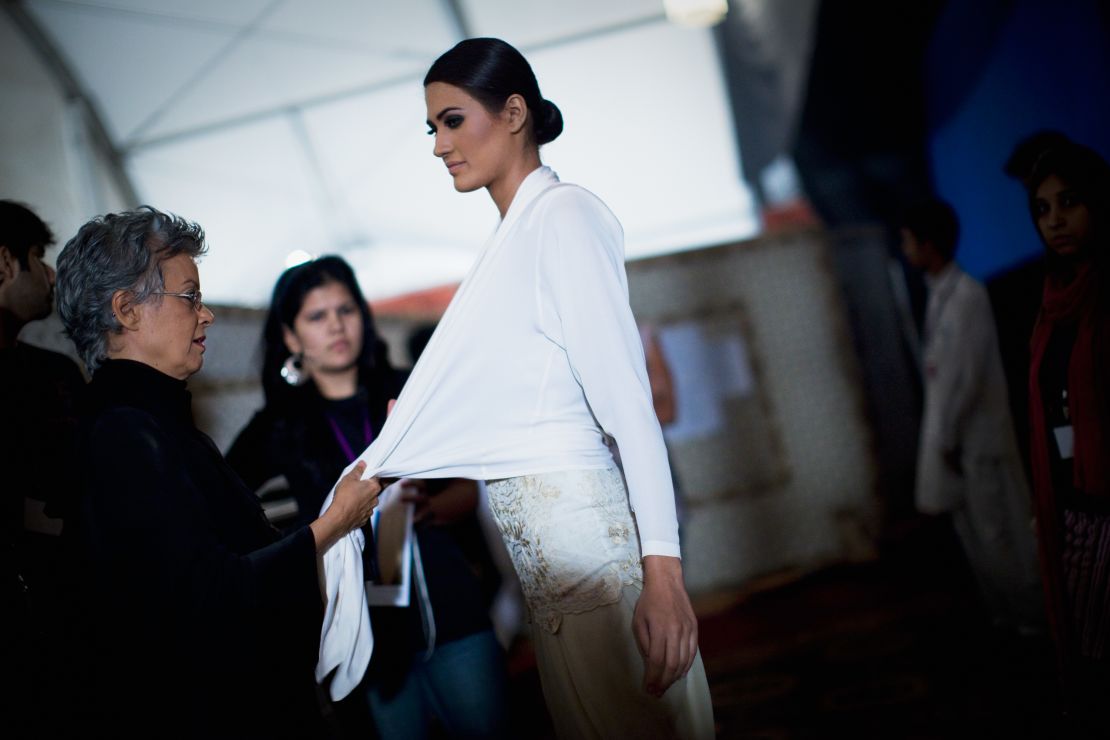Story highlights
Three high-profile Pakistani women have tweeted about their experiences with sexual abuse
The rare public acknowledgment comes as Pakistan comes to grips with a brutal child rape and murder
Three prominent Pakistani women have added their voices to the #MeToo movement in the wake of the rape and murder of a 7-year-old girl in a city in the east of the country last week.
Model and event manager Frieha Altaf, actress Nadia Jamil and fashion designer Maheen Khan all spoke of their experiences with childhood sexual abuse on social media, adding the #MeToo hashtag.
The topics of rape and sexual abuse, so rarely discussed in Pakistan, have been dragged to the foreground of the national conversation in recent weeks, with the rape and murder of Zainab Ansari at the hands of a suspected serial killer.
Her death caused angry street demonstrations in her hometown of Kasul and in the state capital Lahore, and forced a lens on the taboo subject in the often conservative South Asian nation.

In a post on Twitter, actress Nadia Jamil, who is now in her 40s and lives in England, spoke of a number of instances of abuse, seemingly across an extended period of time, beginning when she was just 4 years old.
“When I sexually abused it (was) by my Kari Sahab, my Driver & then by a highly educated elite families son. Now a happily married business man in London. It’s across the board. Men abuse across the board. My family still wants me to stay silent. But the shame IS NOT MINE! Never ever,” she wrote.
A Kari Sahab is a Quranic teacher.
Jamil’s decision to share her painful experiences online helped inspire model Frieha Altaf to do the same. Speaking to CNN, Altaf said she decided to take the issue to social media after seeing Jamil’s post.
Altaf said her childhood experience was “something that I didn’t even know you had to talk about. It was only at 34 that I took stock of it.”
In a post on Twitter, Altaf said she was abused by her cook at the age of 6.
“I was sexually abused by our cook at age 6. My parents took action but everyone remained silent as if it was my shame. At 34 I realised how it had impacted my life. the only shame is keeping SILENT,” she wrote.
Meanwhile, Maheen Khan, one of Pakistan’s most respected fashion designers, had called her friend Altaf to discuss her posts about Zainab, the murdered girl.
Altaf convinced her friend to post about her own experiences on Twitter – she had previously discussed them on a closed Facebook group.
Posting with the hashtag #MeToo, Khan said that she was also abused by a Maulvi, a religious cleric.
“The Maulvi who came to teach me the Quran abused me sexually. I froze in fear day after day. Share in support of children subjected to the sick acts… by so called custodians of our religion.”
Silence through ignorance
Speaking to CNN, Altaf said that sexual abuse in the entertainment industry was common in Pakistan and as a woman she had faced harassment throughout her career.
Altaf said that she hoped her voice would encourage more people to come forward, adding that the issue did not affect only girls, but also many boys in the country.
She said that there are already signs that people were starting to confront the past. “Maheen (Khan) did it, then I’ve had all these people calling me. Even to tell one person is a big step. It makes you feel better, it starts from there. This is what I’ve learned. Then you need to understand the impact of your life from it.”
According to Altaf, the problem lies with attitudes in the conservative country, where sex is considered such a taboo that it is never discussed.
“Social issues, anything to do with sex, it’s such a taboo. You don’t talk about it at home, at school, with your friends, your husband. This is the country (in which) we live.”
Khan said that it is women like her, and Altaf and Jamil, “who are strong enough to come out and speak” because most women aren’t able to.
“What is disturbing is the silent acceptance of women,” she says. “Our society has not taught us to deal with this competently.”
Altaf and Khan say some men in positions of religious authority use the taboo and lack of education about sex to abuse their power, much like the sex scandals within the Catholic church.
“In Pakistan, who do you trust the most? Your family, then (religious leaders),” Altaf says.
“They take advantage of stigma in society. You have to teach your kids, but there’s a problem with the taboo about it. (When I was young) I didn’t know what sex was, I had no idea.”
Khan says she’s “cautiously optimistic” that this nascent movement can enact real change. “We have to seize this moment. This is not going to happen overnight.
“It has to start small and go slow. It will take decades to change this mindset.”
CORRECTION: This story has been updated to give the correct name for 7-year-old Zainab Ansari. It has also been updated to give the correct spelling of designer Maheen Khan.





